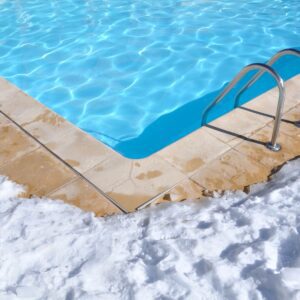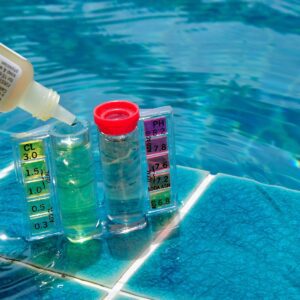A hot tub sanitizer is very helpful in killing bacteria and purifying the water. No doubt, sanitizer is the most important component of a healthy hot tub experience. To support hot tub owners with the necessary information before purchasing hot tub sanitizers, this article will give you must-read advice.

Read Next
Why Do You Need To Use Hot Tub Sanitizer?
Using a hot tub sanitizer is crucial for maintaining clean and healthy water in your hot tub. Without proper sanitation, hot tubs can quickly become breeding grounds for bacteria, viruses, and other harmful microorganisms.
Hot tub sanitizer kills these microorganisms and helps prevent the spread of illnesses such as skin infections, respiratory infections, and gastrointestinal illnesses.
Sanitizers also prevent the growth of algae and other unwanted substances in the water, which can cause cloudy or discolored water, unpleasant odors, and damage to your hot tub equipment.
Regular use of a hot tub sanitizer, along with proper maintenance and cleaning, can help keep your hot tub water clean, clear, and safe for you and your guests to enjoy.
Tips For Using Hot Tub Sanitizers
Here are some tips for using hot tub sanitizers effectively:
- Follow manufacturer instructions - Different sanitizers have different instructions for use, so it's essential to read and follow the manufacturer's guidelines carefully.
- Test the water regularly - Test the hot tub water using test strips to ensure the sanitizer levels are within the recommended range.
- Maintain proper pH levels - Sanitizers work best when the pH levels of the water are balanced. Test the pH levels regularly and adjust if necessary using pH-balancing chemicals.
- Shock the water regularly - Shocking the water with a non-chlorine shock oxidizer or chlorine shock oxidizer can help break down any organic matter and contaminants the sanitizer may have missed.
- Don't mix different types of sanitizers - Mixing different types of sanitizers can be dangerous and may cause adverse chemical reactions.
- Clean the hot tub regularly - Regular cleaning of the hot tub, including draining and refilling the water periodically, can help maintain proper sanitation and prevent the buildup of contaminants.
Following these tips and maintaining a regular hot tub maintenance routine ensures your hot tub water is properly sanitized and safe for use.
Top Best Type Of Hot Tub Sanitizer
There are several types of hot tub sanitizers available, each with its own unique benefits and drawbacks. Here is a comparison of some of the most popular hot tub sanitizers:
- Chlorine - Chlorine is the most commonly used sanitizer in hot tubs. It is relatively affordable and highly effective at killing bacteria, viruses, and algae. However, chlorine can irritate the skin and eyes and cause a strong odor in the water.
- Bromine - Bromine is a gentler alternative to chlorine on the skin and eyes. It is also effective at killing bacteria, viruses, and algae. However, bromine is more expensive than chlorine and can be less stable in hot water.
- Mineral sanitizers - Mineral sanitizers use minerals such as silver, copper, and zinc to kill bacteria and other microorganisms. They are gentler on the skin than chlorine and bromine and can reduce the need for other chemicals. However, mineral sanitizers can be expensive and may not be as effective as chlorine or bromine at killing certain bacteria.
- Ozone - Ozone is a highly effective gas that kills bacteria and other microorganisms. It is a powerful oxidizer and can help reduce the need for other chemicals. However, ozone generators can be expensive and may require professional installation.
- UV-C - UV-C sanitizers use ultraviolet light to kill bacteria and other microorganisms. They are effective and chemical-free. However, UV-C sanitizers can be expensive and may require professional installation.
Overall, the best hot tub sanitizer for you will depend on your personal preferences, budget, and hot tub usage.
- Chlorine and bromine are the most widely used sanitizers and are effective and affordable options.
- Mineral sanitizers, ozone generators, and UV-C sanitizers are alternatives that may be gentler on the skin and reduce the need for other chemicals, but they can be more expensive.
It's important to follow the manufacturer's instructions and maintain proper water balance and cleanliness, regardless of the type of sanitizer you choose.





Comments
No Comments